I wrote tests using chai. Here are just three example tests:
(In reality, there are more tests, please check out the repl linked)
File: tests/2_functional-tests.js
const chaiHttp = require('chai-http');
const chai = require('chai');
const assert = chai.assert;
const app = require('../app');
chai.use(chaiHttp);
const request = chai.request;
let id1;
let id2;
suite('Functional Tests', function() {
test("Create an issue with every field: POST request to /api/issues/{project}", async () => {
const res = await request(app)
.post("/api/issues/testproject")
.set('content-type', 'application/x-www-form-urlencoded')
.send({
issue_title: "Test issue",
issue_text: "Test issue text",
created_by: "Chai func test nr 1",
assigned_to: "nobody :P",
status_text: "didn't even start"
});
assert.equal(res.status, 200);
let responseObj = JSON.parse(res.res.text);
assert.equal(responseObj.issue_title, "Test issue");
assert.equal(responseObj.issue_text, "Test issue text");
assert.equal(responseObj.created_by, "Chai func test nr 1");
assert.equal(responseObj.assigned_to, "nobody :P");
assert.equal(responseObj.status_text, "didn't even start");
assert.isTrue(responseObj.open);
id1 = responseObj._id;
});
test("Create an issue with missing required fields: POST request to /api/issues/{project}", async () => {
const res = await request(app)
.post("/api/issues/testproject")
.set('content-type', 'application/x-www-form-urlencoded')
.send({
issue_title: "Test issue 3", //no issue_text
created_by: "Chai func test nr 3"
});
assert.equal(res.status, 200);
let responseObj = JSON.parse(res.res.text);
assert.equal(responseObj.error, "required field(s) missing")
});
test("View issues on a project with multiple filters: GET request to /api/issues/{project}", async () => {
const res = await request(app)
.get("/api/issues/testproject?open=true&created_by=Chai+func+test+nr+1")
assert.equal(res.status, 200);
let responseObj = JSON.parse(res.res.text);
assert.equal(responseObj.length, 1);
assert.equal(responseObj[0].issue_text, "Test issue text");
assert.equal(responseObj[0].status_text, "didn't even start");
assert.equal(responseObj[0].created_by, "Chai func test nr 1");
assert.equal(responseObj[0].open, true);
});
});
These tests work all as expected. I don't get any errors. Nonetheless, these tests stop my express server from listening.
Here I am listening and then starting the test runner:
(in the server.js file)
const listener = app.listen(process.env.PORT || 3000, function () {
console.log('Your app is listening on port ' + listener.address().port);
if (process.env.NODE_ENV === 'test') {
console.log('Running Tests...');
setTimeout(function () {
try {
runner.run();
} catch (e) {
console.log('Tests are not valid:');
console.error(e);
}
}, 5000);
}
});
When I start the server, it listens and all routes are available. However, after the test runner starts, the server stops listening and the routes stop working. But interestingly, if I remove the tests and run just the empty suite, like this:
const chaiHttp = require('chai-http');
const chai = require('chai');
const assert = chai.assert;
const app = require('../app');
chai.use(chaiHttp);
const request = chai.request;
let id1;
let id2;
suite('Functional Tests', function() {
});
...everything works fine and the server keeps listening.
The runner.run is in the test-runner.js file the emitter.run function.
const analyser = require('./assertion-analyser');
const EventEmitter = require('events').EventEmitter;
const Mocha = require('mocha'),
fs = require('fs'),
path = require('path');
const mocha = new Mocha();
let testDir = './tests'
// Add each .js file to the mocha instance
fs.readdirSync(testDir).filter(function(file){
// Only keep the .js files
return file.substr(-3) === '.js';
}).forEach(function(file){
mocha.addFile(
path.join(testDir, file)
);
});
let emitter = new EventEmitter();
emitter.run = function() {
let tests = [];
let context = "";
let separator = ' -> ';
// Run the tests.
try {
let runner = mocha.ui('tdd').run()
.on('test end', function(test) {
// remove comments
let body = test.body.replace(/\/\/.*\n|\/\*.*\*\//g, '');
// collapse spaces
body = body.replace(/\s+/g,' ');
let obj = {
title: test.title,
context: context.slice(0, -separator.length),
state: test.state,
// body: body,
assertions: analyser(body)
};
tests.push(obj);
})
.on('end', function() {
emitter.report = tests;
emitter.emit('done', tests)
})
.on('suite', function(s) {
context += (s.title + separator);
})
.on('suite end', function(s) {
context = context.slice(0, -(s.title.length + separator.length))
})
} catch(e) {
throw(e);
}
};
module.exports = emitter;
This is a project of the freecodecamp.org curriculum, and the test-runner.js is just from the starter project, so I didn't touch it and I don't think there is anything wrong with it.
What could be the problem? Could it be that something is severely wrong with the code structure?

